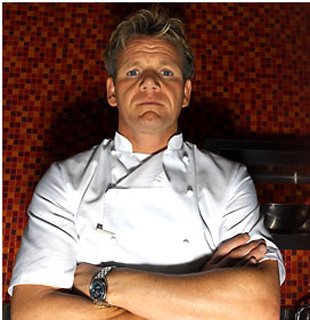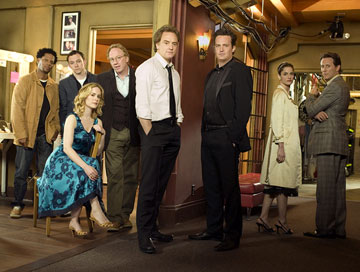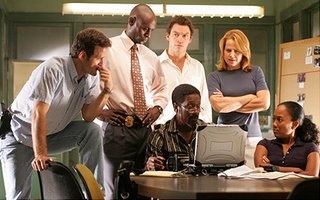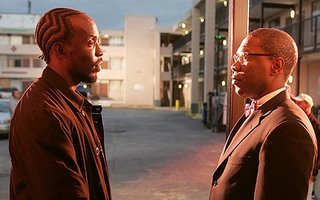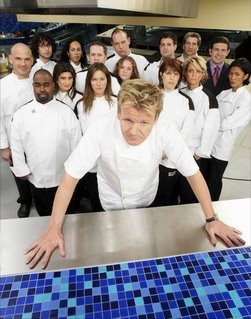Termite Television: The Rise and Fall of Danity Kane

I was trying to fashion a tweet about Making the Band: The Rise and Fall of Danity Kane but there's no way to talk about all that is fascinating (yet incredibly boring) about this hour of television in just 140 characters. This recap of numerous seasons of the long-running television series purports to pull back the curtain on the pop group's recent breakup but all it really reveals are the limitations of "reality" television.
Deriding the lack of reality surrounding so-called reality television is nothing new. At this point, it's pretty obvious reality television is, at best, carefully production managed and scrupulously edited and, at worst, thinly veiled scripted fiction. Still, regardless of the circumstances of its production (one I attest to knowing nothing about), there were some things about Making the Band that were incontestably real: this group assembled and svengali'd by Sean "Diddy" Combs released two albums, played concerts, had several hit singles; my wife and I danced to one of them in a bar just last night.
Making the Band is a strange relic, a lumbering beast from the paleozoic era of reality TV; so old, in fact, that in its initial conception it was designed to put together the next big boy band back when the phrase "boy band" was still a big deal. The series outlived a switch from broadcast to cable and even the band it had made (That'd be the now defunct O-Town). When the show's reins were passed along to Diddy, he invented his own group, Da Band. When it crumbled after three seasons, he hit upon the idea of inventing yet another group, this time an all-girl concoction. This fivesome would eventually become known as Danity Kane, and this hourlong special, The Rise and Fall of Danity Kane, charts the group's early successes and eventual dissolution. The story itself is almost entirely without interest, but as a referendum on reality TV's shortcomings, it's absolutely riveting.
Here's what I mean. The show is called Making the Band, and if it's doing its job right, it should show you what it's like inside the inner circle of this up-and-coming band. And yet not even Making the Band knows exactly why the group broke up! Though cameras were present for a scene where Diddy fires two of band's five members, the show's narrator professes that it's still not clear what broke up the group. The show ends with its narrator asking questions like "Was it Aubrey desire to create her own image that broke them apart?" "Or was it the dissolution between the friendship between Aubrey and Aundrea?" Why are you asking ME, TV voice? YOU were there! Shouldn't you have some idea?
Despite hundreds of hours of footage and dozens of cameras, the series didn't capture the actual reality surrounding its "reality" show. It is the televisual equivalent of a guy who thinks his relationship with a woman is going perfectly well, is shocked when she dumps him, looks back over his memories of their time together and sees no evidence of trouble the has to be told by his best friend that she was cheating on him all along. Either the people making Making the Band were inobservant or the people they were following were willfully hiding crucial information from the cameras. Either is a fatal flaw.
The most interesting figure in the entire show is Aubrey O'Day, one of the first girls fired from the group by Diddy. In the picture above, she's the one to the far left styled like she could become the next cast member of another MTV reality show, The Hills. What little footage of unrest within Danity Kane exists comes via the numerous battles O'Day had with Diddy over her appearance, her attitude, her feelings, her dance moves, her whatever. Diddy doesn't like that O'Day puts herself before the group, but based on the evidence in this show, it was a wise move; though the show may be titled The Rise and Fall of Danity Kane but it might as well be subtitled The Aubrey O'Day Story. She's the member with the most screentime, the most on-camera interviews, and the most glamour shots (particularly useful in charting O'Day's eerie transformation from a normal, pretty looking girl into a full-size Pussycat Doll Barbie). Even if the controversy got her fired from the band, it also got her the most attention, and created a feedback loop whereby now she's the character around which all DK stories center. Then again, this may have less to do with telling the "true story" of the group and more about setting O'Day up for her solo reality show, which is supposedly in the offing later this year.
That's what you're left with, really, the use of a reality show as a carefully disguised PR device. When Diddy fired O'Day and D. Woods on camera, he did it in a showroom for his clothing line. When Danity Kane or their sibling group Day26 release an album, it's typically timed to coincide with Making the Band's season finale. There's lots of undiscovered musical talent out there; Diddy could presumably find lots more people to sign and develop (and yell at, and control, and critique) without resorting to a television series to do it. But the show acts as the perfect way to promote the artists, and its a canny way of propping up record sales at a time when the whole industry is struggling. It's all brilliant advertising for a real fiction.
Labels: Termite Television




